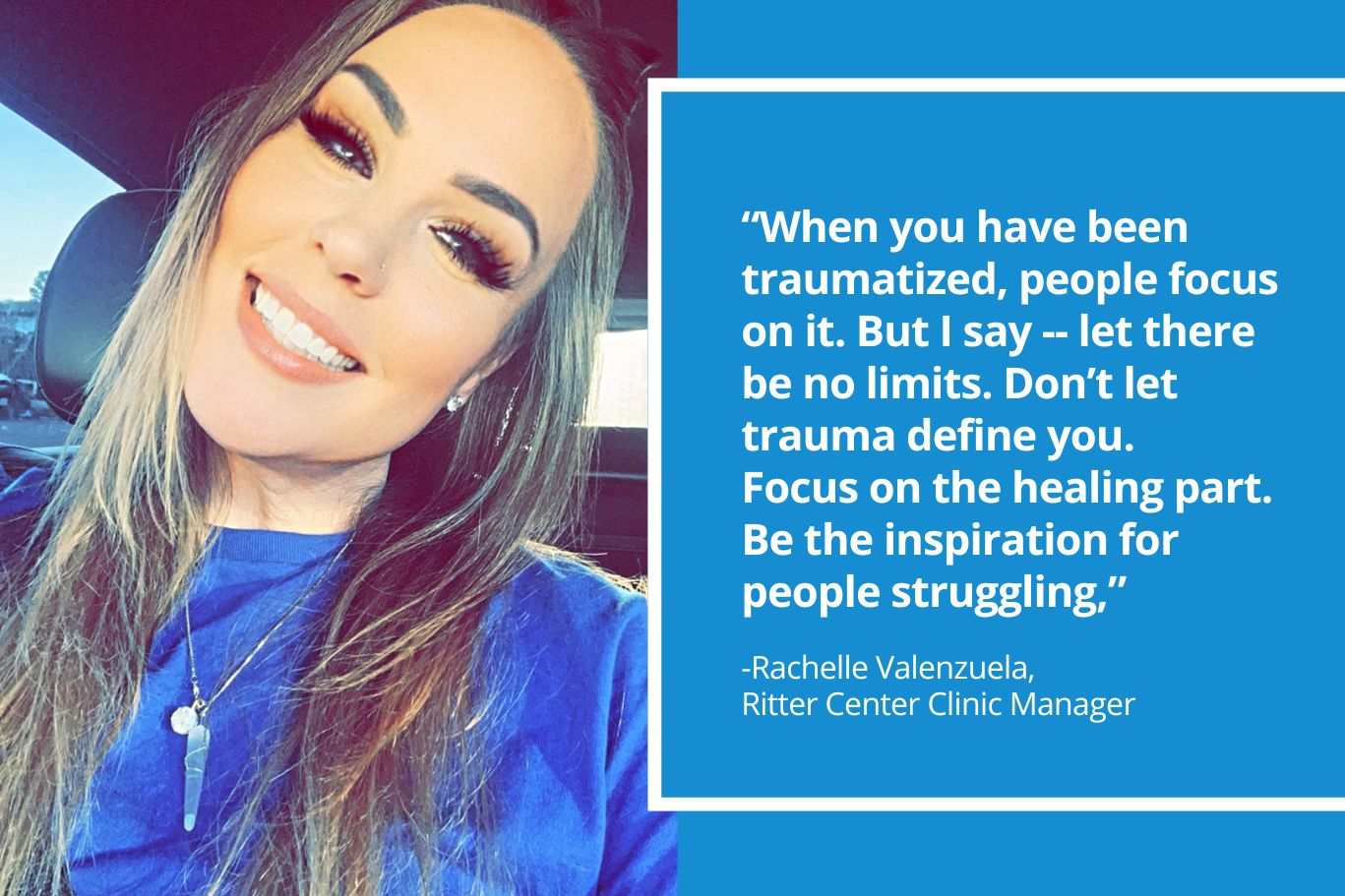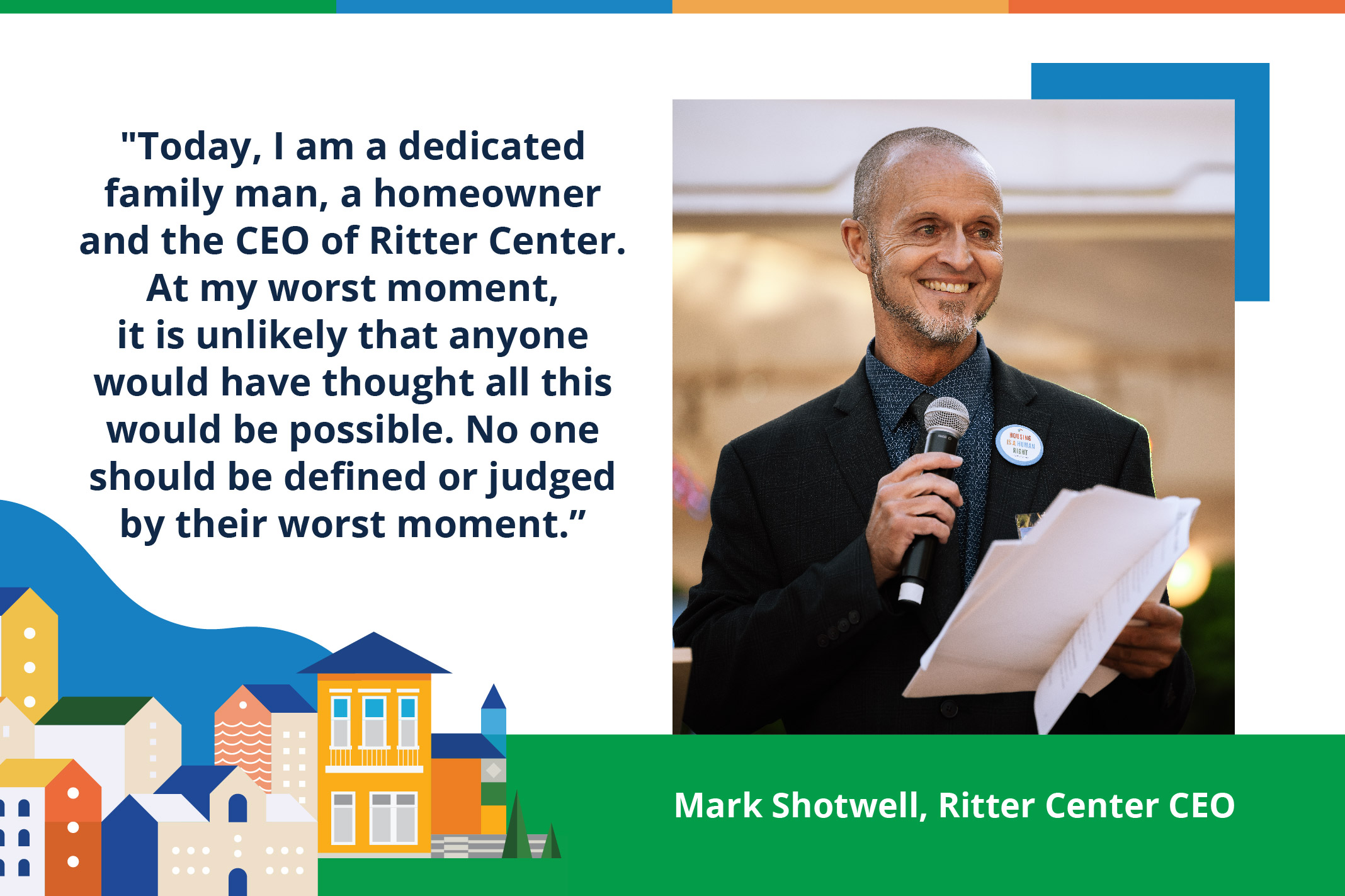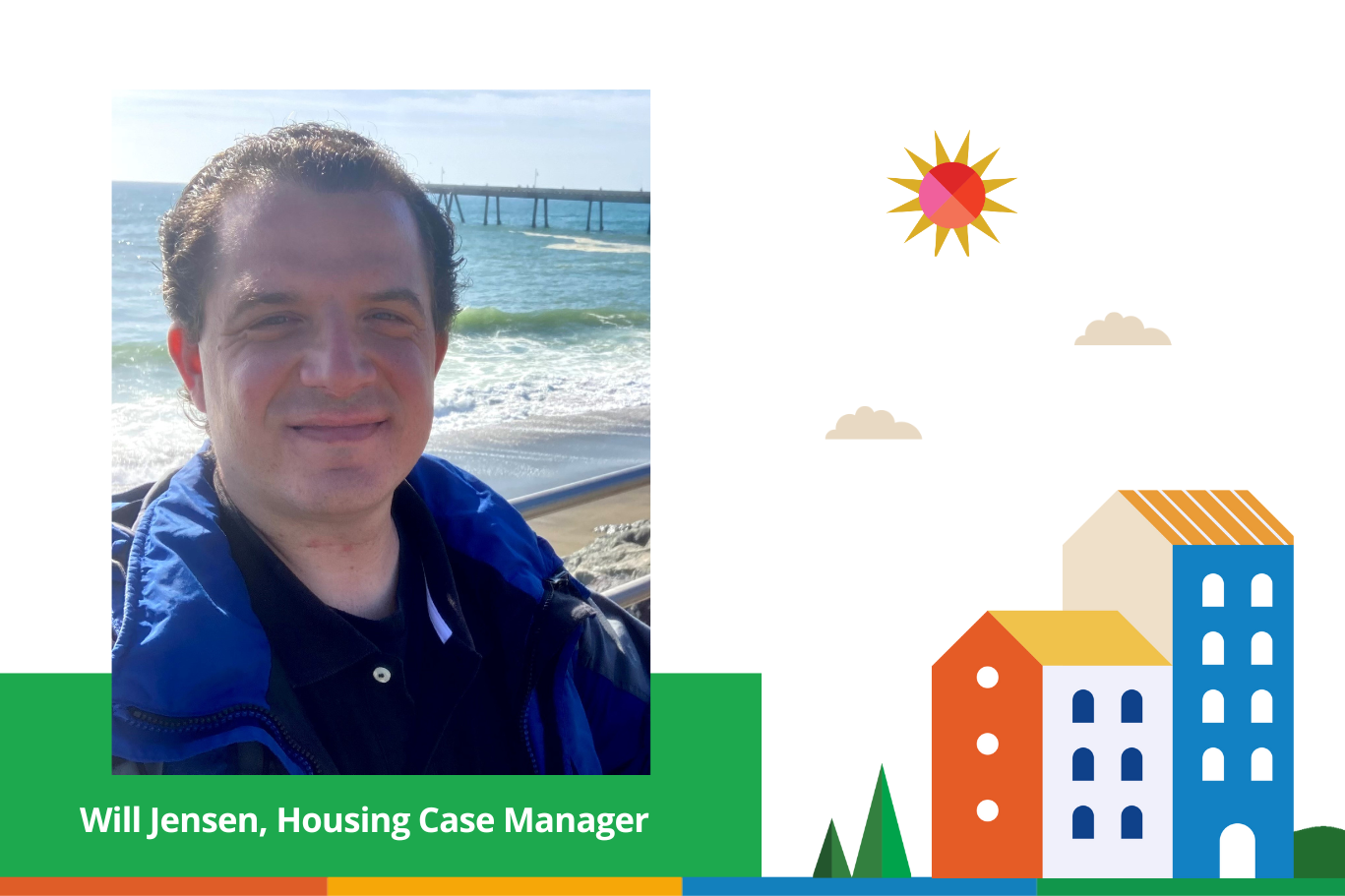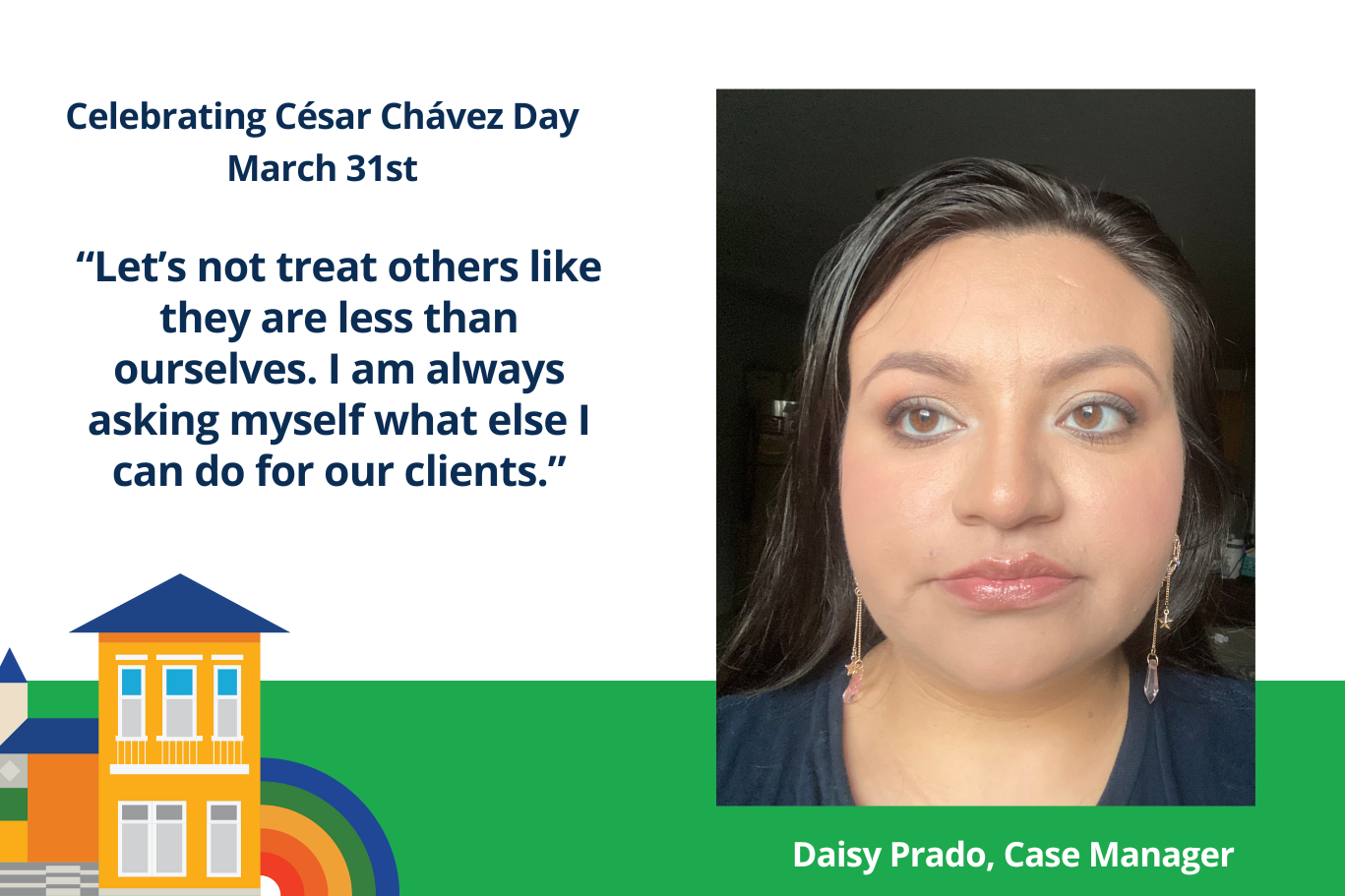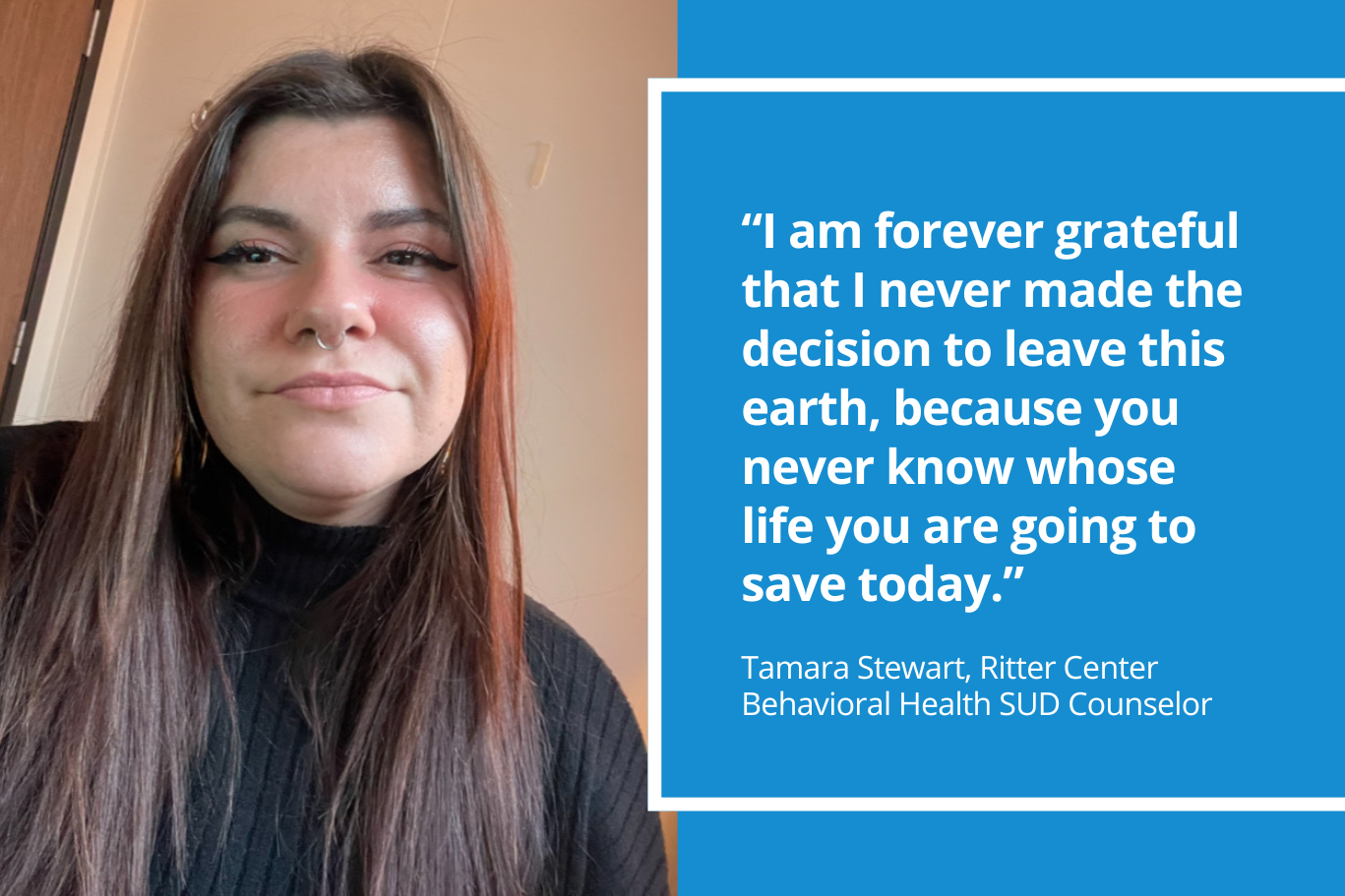
Interview with Ritter Center Behavioral Health Substance Use Disorder Counselor, Tamara Stewart
“Mental health challenges have always been a part of my life,” said Tamara Stewart, Ritter Center Behavioral Health Substance Use Disorder Counselor. “I have suffered from severe mental health disorders that were never diagnosed. My earliest memories of suicidal ideation are from when I was 5 years old. As I grew older, I realized I was not the only one struggling with mental health in our household, and I have strong, difficult memories of that from my childhood.”
Even from a very young age, Tamara’s experiences with her mother meant she knew all too well how debilitating mental illness can be. Her mother used to sing Three Little Birds by Bob Marley to assure her that this too shall pass. But at the same time, despite her mother’s attempts to soothe and knowing her mother loved her, the mental emotions and struggles that escalated to the point of defeat were very familiar. “I grew up in a low-income family. Getting help was something that I believed would never be an option. I don’t think I even understood the concept of getting help for non-physical issues,” remembered Tamara.
Tamara’s family only saw a doctor if someone had broken an arm or something perceived as similarly critical and a “true” emergency, although the mental health challenges certainly rose to that level but were not addressed. But things shifted for Tamara herself as she grew older and more aware of the internal struggles in her own mind.
“I always felt different and out of place. I felt like something was wrong with my brain. I felt like it was broken. What made it even more difficult was that I never had access to an evaluation or an opportunity for a diagnosis – or even a basic understanding that help was actually possible for myself. I didn’t have awareness, knowledge or ability to identify the resources to get help,” reflected Tamara. “If I heard that someone had a therapist, I thought they had to have a lot of money. I didn’t ever think it was possible for someone like me to get help.”
The inherent struggles of her childhood and the inevitable challenges that followed during adolescence and young adulthood meant that Tamara succumbed to the brief relief that substances brought to her pain.
“Drugs and alcohol were the only things that could quiet my brain. When I first went to residential treatment, I finally saw the opportunities possible with this incredible chance to get diagnosed and understand myself, and how I came to be where I was at that point in time. I felt defeated but also saw the sliver of light, and there was the possibility of holding on to hope. A lot of the clients I serve at Ritter Center feel defeated, and so I can relate to that overwhelming feeling that you can never overcome these giant obstacles.When they finally have the courage to ask for help, they have most likely already hit a wall. It is the hitting of that very wall that brings them to the most vulnerable place, which is to ask for help,” she said.
“It is a place of both profound strength and weakness at the same time. They don’t feel that they deserve help. They think that they aren’t worthy. They don’t believe that they have the resources to persevere and survive. Yet they are able to start the true journey of testing the waters to see what psychiatric medicines might be of benefit to them, in addition to therapy. There is so much stigma surrounding psychiatric help, when in reality it can save someone’s life.”
This process is a very long and difficult road. Without precision medicine in psychiatry being fully developed, the trial and error process of trying a psychiatric medication such as an antidepressant can be a very draining and stressful process. This is particularly ironic given that SSRIs are designed to relieve the anxiety that is debilitating in the first place.
But this is what has to be faced, and with an average trial of 6 weeks to begin to perhaps see positive changes, this is not a process that is easy. Sometimes the first medicine chosen can be the right one, but other times the medicine must be switched and that process is also incredibly challenging. This can feel so defeating and discouraging especially for someone in a mental crisis. In the meantime, there is no instant relief which is why many turn to substances.
“I used to want to kill myself every day. It wasn’t that my life was so bad. I had a supportive family. There were people that loved me, and I had a roof over my head and food to eat,” remembered Tamara. “I just didn’t want to be on this earth anymore; I felt it was the only option to quiet my brain. I felt this way from the moment I woke up to the moment I was able to fall asleep. It was debilitating. Looking back today at that makes me very emotional. I could have made that decision to not be here anymore. Now I can wake up in the morning and go to sleep at night without the extreme discomfort of those thoughts. I want to be alive, and that’s something I never thought was possible for me. This is nothing short of a miracle, and this is precisely the hope that’s hard to communicate to others.”
But it is this very hope that Tamara is dedicated to conveying. She is driven to want to communicate to others that you can feel OK and safe in your body. She shares that It takes time, but it is achievable. It can be done. You just have to keep doing it and not give up. It is simple, but not easy.
Tamara is passionate about giving people hope in a variety of ways and for a number of reasons. One of those stems from her grandmother. “My grandma is the love of my life. She doesn’t personally suffer from extreme mental health issues or substance abuse; but is so supportive and loving with no judgment. My grandma has witnessed my mother and siblings struggle for a multitude of reasons, and she has always been in our corner,” recalled Tamara.
Tamara’s beloved grandmother, mother and siblings watched her go through this journey of getting sober and addressing her mental health. She lived through what felt like endless, hopeless days of uncontrollable depression, layered in with anxiety and suicidal ideation; which was later diagnosed as Bipolar 1, Chronic Depression/Anxiety, PTSD and ADHD.
“I cried to her all of the time. There were long strings of dark weeks. Grandma has witnessed so many of us in our family system with our addictions and struggles. I can’t imagine from her perspective what it must be like for her. It’s out of her hands. She can’t hug me long enough in order to make it better, or talk to me long enough to appease the anxiety. She can’t make my brain rewire. There is no instant solution. My grandma always told me that she wished she could take all the pain away. It hurt me to see her feel so helpless especially from something I was causing. I felt I was causing her so much pain.” shared Tamara.
Currently, Tamara is extremely grateful to work at Ritter Center in Behavioral Health as a Substance Use Disorder Counselor. She brings her lived experience to her role.
“I didn’t know something like this job existed until I got sober and went through residential treatment. I received the help of multiple counselors and therapists who inspired me to be in this line of work. I can now give back to others. I remember how everyone wanted to give me a diagnosis immediately to start the medication process. It was overwhelming. There were so many questions that I was scared to give the answers to, and I was worried that If I was honest about what was going on in my head, I would get locked up in a psych ward forever. I have only seen it portrayed in movies, but it did not look like somewhere I wanted to go. It was during this process when I finally started to surrender.” she said.
Tamara wanted to work with people who were like her: people who had low incomes and didn’t have access to resources or know where to start. She wanted to make sure that people learned that they are not alone, and to know it’s possible to live a life where you are not miserable. “I want them to discover that you can one day look in a mirror and not hate what you see looking back at you. Fulfilling is not even the right word for how I feel about this job. And I feel so lucky to be a part of the Behavioral Health team that shares my values and drive to help those in need. There isn’t a word in the English language that is powerful enough to describe it,” said Tamara.
“When I am looking at someone who is struggling like I was not too long ago – lost, uncomfortable and hopeless – there is nothing I can say or do to help unless that person begins to see that they are capable of doing the work to get the help they need. But if they even set foot in the Behavioral Health department they are already taking a step in the right direction. I can be their support system and their number one fan until they begin to see it on their own. I will help guide them on the path of healing until they see that they deserve it. They deserve the treatment and resources just as much as everyone else,” described Tamara passionately.
“By no means is my mental health perfect, nor do I ever expect it to be. When I see a client start to hold their head held high, belly-laughing with others and the light turning back on in their eyes, I am reminded of why I do what I do. We are all worthy of taking up space in this world. And I am forever grateful that I never made the decision to leave this earth, because you never know whose life you are going to save today.”
Learn more about Ritter Center’s behavioral health care here.

